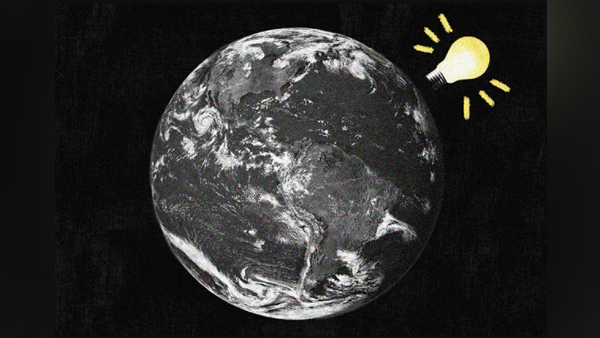By Satyabrat Borah
The notion that Earth might be an intelligent entity is a concept that transcends the boundaries of science, philosophy, and ecology, inviting us to reimagine our relationship with the planet we call home. This idea, rooted in the Gaia Hypothesis and expanded through recent scientific explorations, challenges us to view Earth not merely as a rocky sphere but as a complex, self-regulating system capable of exhibiting a form of collective intelligence. As an Indian, living in a land where nature has always been revered, this perspective resonates deeply, urging us to reflect on our role within this intricate web of life. Could Earth, like a living being, possess a form of intelligence that responds to the actions of its inhabitants? And if so, how does this change the way we perceive our responsibilities towards it?
The Gaia Hypothesis, first proposed by James Lovelock and Lynn Margulis in the 1970s, forms the foundation of this idea. It posits that Earth functions as a self-regulating superorganism, where living organisms and their environment interact to maintain conditions suitable for life. This is not a poetic metaphor but a scientific framework that highlights the intricate feedback loops between the biosphere and the planet’s physical systems. For instance, the oxygen produced by plants and the carbon dioxide regulation by oceanic microorganisms contribute to stabilizing Earth’s atmosphere and climate. These processes suggest a delicate balance, where life actively shapes its environment to ensure its survival. In India, where ancient traditions like those in the Vedas celebrate the interconnectedness of all life, the Gaia Hypothesis feels like a scientific echo of age-old wisdom that views nature as a living entity.
Building on this, a recent paper published in the International Journal of Astrobiology by astrophysicist Adam Frank, astrobiologist David Grinspoon, and theoretical physicist Sara Walker introduces the concept of planetary intelligence. This idea suggests that Earth’s complex networks like biological, chemical, and physical systems could give rise to a form of collective cognition. Unlike human intelligence, which is rooted in individual consciousness, planetary intelligence emerges from the interconnected dynamics of ecosystems. A striking example is the mycorrhizal networks in forests, often called the “wood wide web,” where fungi facilitate communication and resource sharing among trees. These underground networks allow plants to exchange nutrients and even warn each other of threats, resembling a primitive form of intelligence. Such phenomena hint at the possibility that Earth’s biosphere operates as a unified system, capable of responding to changes in ways that mirror intelligent behavior.
This concept of planetary intelligence is not about Earth possessing a human-like mind or emotions. Instead, it refers to the emergent properties of a complex system, where the whole is greater than the sum of its parts. Just as a colony of ants exhibits collective intelligence through simple interactions, Earth’s ecosystems might display a form of problem-solving capacity. For example, the regulation of atmospheric gases or the cycling of nutrients through the carbon and nitrogen cycles demonstrates a remarkable ability to maintain equilibrium. These processes, driven by countless organisms and environmental factors, suggest a system that adapts and responds to disruptions, much like an intelligent entity would.
In the Indian context, this idea resonates profoundly. Our country, with its rich biodiversity and sacred landscapes, has long recognized the sanctity of nature. From the reverence for rivers like the Ganga to the protection of sacred groves in states like Meghalaya, Indian culture embodies a deep respect for the environment. Yet, rapid industrialization, deforestation, and pollution are straining these ecosystems. If we consider Earth as an intelligent entity, the degradation of its forests, rivers, and biodiversity takes on a new significance. It becomes not just an environmental issue but a disruption of a complex, intelligent system that sustains us. The floods in Assam, the drying rivers in South India, and the melting glaciers in the Himalayas are signals that this system is under stress, perhaps struggling to maintain its balance.
The implications of viewing Earth as an intelligent entity are far-reaching. It forces us to rethink our relationship with the planet. In India, where millions depend on natural resources for their livelihoods, this perspective could transform how we approach conservation. For instance, protecting areas like Kaziranga National Park or the Sundarbans is not just about preserving wildlife but about safeguarding the components of a larger, intelligent system. These ecosystems, with their intricate networks of plants, animals, and microorganisms, contribute to the planet’s ability to regulate itself. By damaging them, we risk disrupting the very intelligence that keeps Earth habitable.
This idea bridges science and philosophy, a synthesis that feels particularly relevant in India, where spirituality and rationality often coexist. The concept of planetary intelligence aligns with the Indian philosophical view of interconnectedness, as seen in concepts like Vasudhaiva Kutumbakam—the world as one family. If Earth is indeed an intelligent entity, then humanity is not separate from it but an integral part of its functioning. Our actions,whether polluting rivers, burning fossil fuels or restoring forests become inputs into this intelligent system, influencing its ability to maintain balance. This perspective challenges the anthropocentric view that places humans above nature, urging us instead to see ourselves as partners in a larger, living whole.
The question of how Earth’s ecosystems would respond if we recognized its intelligence is profound. In practical terms, it could inspire a shift in policy and behavior. In India, where environmental challenges like air pollution and water scarcity are pressing, acknowledging Earth’s intelligence could lead to more holistic approaches to sustainability. For instance, urban planning could prioritize green spaces not just for aesthetic reasons but as vital components of the planet’s regulatory systems. Similarly, traditional practices like organic farming or rainwater harvesting, deeply rooted in Indian culture, could be seen as ways to align with Earth’s intelligent processes rather than against them.
On a global scale, this idea has implications for addressing climate change. If Earth’s intelligence lies in its ability to self-regulate, then human-induced disruptions like greenhouse gas emissions are akin to throwing a wrench into a finely tuned machine. The rising temperatures, extreme weather events, and loss of biodiversity are not just environmental crises but signs that we are pushing Earth’s intelligent system beyond its limits. By recognizing this, we might approach climate solutions with greater urgency, focusing on restoring ecosystems and reducing our ecological footprint.
The idea that Earth could be an intelligent entity is both a scientific hypothesis and a philosophical call to action. It invites us to see our planet not as a passive backdrop but as a dynamic, interconnected system that responds to our actions. In India, where nature has always held a sacred place, this perspective feels like a return to our roots—a reminder that we are part of something much larger than ourselves. By embracing this view, we can foster a deeper sense of responsibility, not just to protect the environment but to nurture the intelligence that sustains life on Earth. As we stand at the crossroads of ecological crises, this idea offers hope: by working with Earth’s intelligence, we can build a future where humanity and the planet thrive together.




